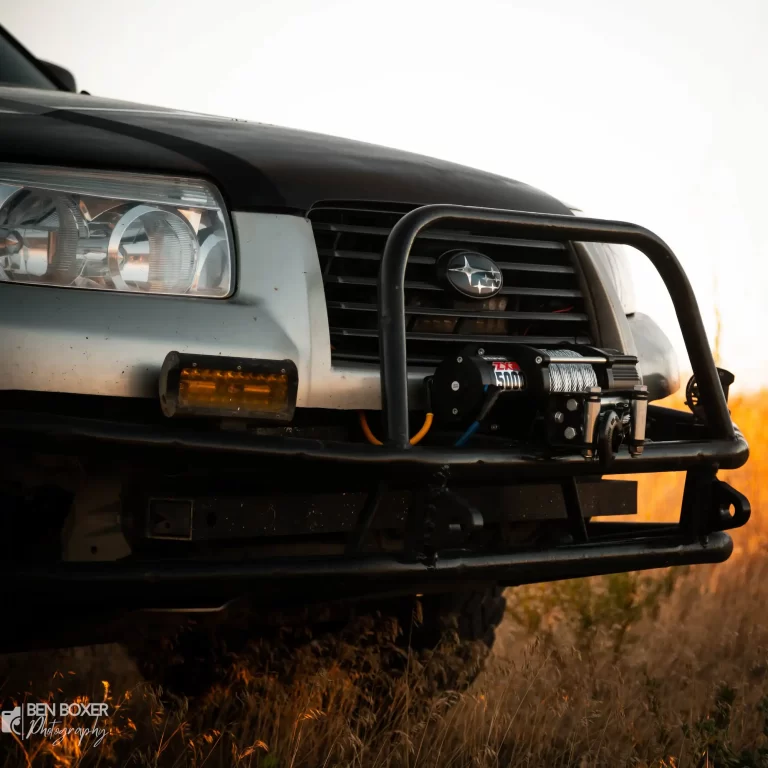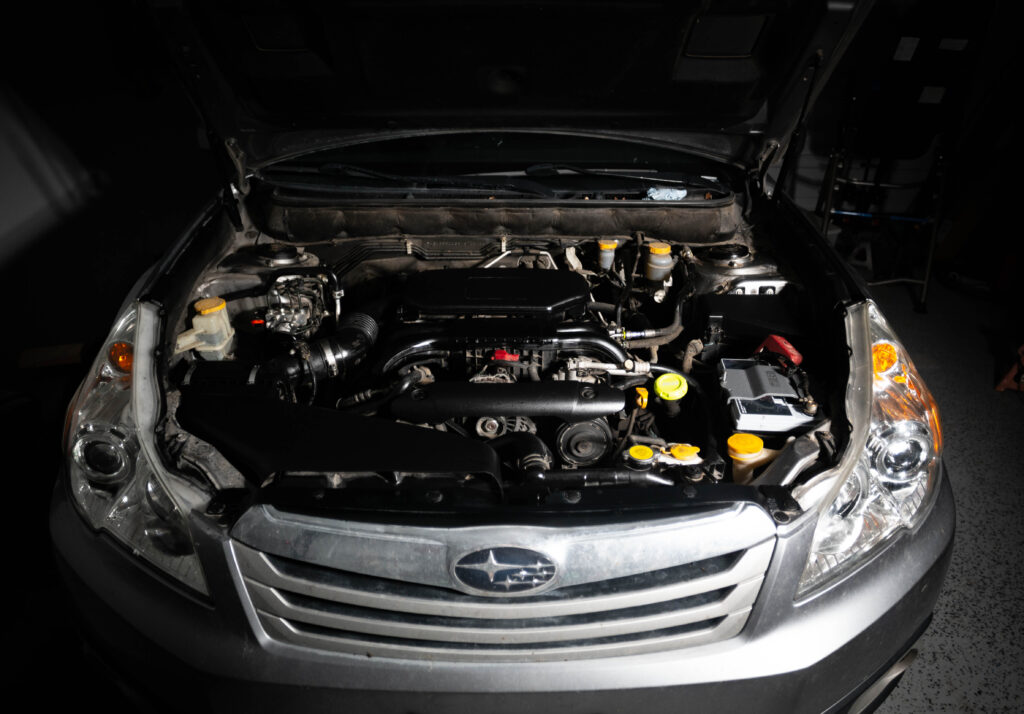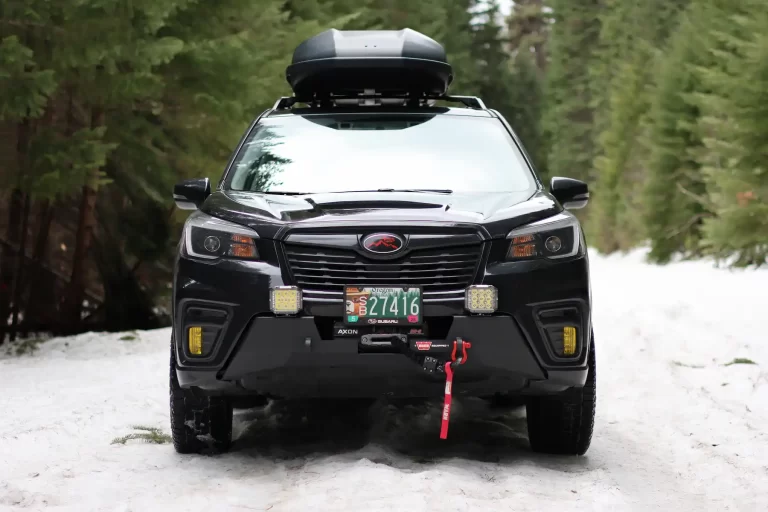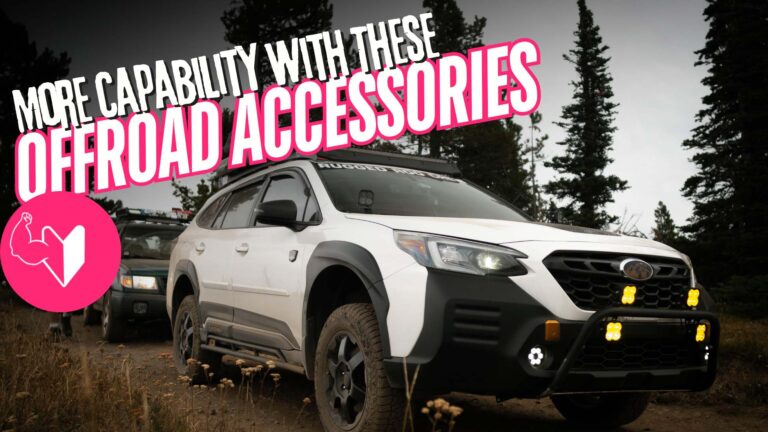

It’s not uncommon to hear a Subaru owner discussing their purchase decision saying something like “I wanted to be able to get up to the mountains, but I didn’t want a gas guzzling 4×4.” With their effective AWD system and ample cargo room, they truly are one of the best platforms for many active individuals who want to explore the world without overspending on fuel.
However, they aren’t quite as fuel efficient as a Prius, Honda Civic, and most of the other front wheel drive economy cars out there. But there are still things you can do to maximize the fuel efficiency in your Subaru.
Table of Contents
6 ways I maintain the best possible gas mileage in my Subarus:
1. Keep your vehicle uncluttered – inside and out
It’s tempting to keep a ton of recovery gear, safety items, and daily items in your car that you think you may need. It’s not uncommon for me to clean my car out and find about 35 lbs. of extra weight in the trunk and floor boards. Things like gym bags, clothing, tools, and water bottles can add a lot of unnecessary weight to the car. I have a really bad habit of keeping water jugs in my car that I’m too lazy to carry in after a grocery store visit. Fun fact: water weighs over 8 lbs. per gallon. The Department of Energy states that for every 100 lbs. of extra weight, gas mileage is reduced by up to 2%. This might not seem like a lot, but every small amount we can save makes a difference.
We want to keep the inside of the car free of excessive weight. But more importantly, the exterior of the car should be free of extra accessories that are not in use. For example, if you have a roof box that you know won’t need to be utilized for a couple months, consider removing it. The same goes for exterior mounted fuel cans and roof top tents. Not only do these items add weight, but they interrupt the aerodynamic flow of the vehicle further reducing fuel economy. My friend Tim carried a bunch of Rubbermaid tubs on his roof rack on a long trip and he explained that his fuel economy dropped by over 10mpg.
Here are a list of things that I still keep in my vehicle at all times regardless of weight:
- Tire repair items
- Portable air compressor (I use Viair products. Here’s a list of my Favorite Air Compressors)
- Jump start box (I use the NoCo battery jumpers because they’re light, powerful, and dependable.)
- Regular safety items like flares, first-aid kit, and a fire extinguisher
2. Keep your tires inflated to the correct pressure
Many off-road enthusiasts air their tires down while traveling rough roads. However, it’s very important to reinflate to the correct air pressure once returning to pavement. If you’re on stock tires, fill them to the recommended pressure in the owner’s manual. If a person has aftermarket tires, a quick phone call or email to the manufacturer should be an easy way to determine the best air pressure to run. Using underinflated tires can result in a large reduction in efficiency. For every 5psi a tire is low, it can translate to up to 2-3% in fuel economy loss. Underinflated tires can also cause faster tire wear.
We certainly air down our tires while traveling off-road. It helps make the trip more comfortable, reduces vibration to the vehicle’s suspension components, and offers much more grip. But it’s imperative that you re-inflate the tires to the correct pressure before getting back on the pavement. We carry portable compressors with us at all times. They’re affordable and work great. To see our favorite picks for portable compressors under $200, check out my air compressor buying guide (we’re currently using Viair compressors.)
3. Install the lightest wheel possible
The amount of weight contained within your wheel and tire combo can drastically affect your fuel economy. According to TireRack.com, a 3 lb lighter wheel can translate into a 5% improvement in fuel efficiency. Unless you specifically need a heavy wheel for off-road use, a lightweight wheel like the Enkei RPF1 or the Konig Hypergram could help bring down the unsprung weight of your wheels. It’s also really interesting to feel the performance difference when using a lightweight wheel. The car feels much more responsive and “alive.”
4. Adjust your driving habits to increase fuel economy
Whether your Subaru is lifted with bigger tires, or stock, easing into the throttle from a dead stop can improve miles per gallon. Avoiding quick acceleration is a great driving practice for fuel economy and engine longevity. I also prefer to look further ahead and try not to perform any hard braking. As soon as I see a slow down ahead, I simply let off the throttle and coast gently to stop signs, stop lights, or traffic back ups. According to Uftring Subaru, hard braking and rapid acceleration can drop fuel economy by up to 40%. I can personally attest to the benefits that conservative driving has on your MPG.
It’s also a good idea to drive the speed limit in order to save money on fuel. Not only will you avoid tickets, but driving faster doesn’t always result in better fuel economy. Of course the optimal speed will vary between cars based on gear ratios, tire size, etc. but we’ve had much better luck conserving fuel by not driving at excessive speeds.
5. Keep up on basic maintenance
Routine maintenance can help keep your car’s engine running longer and more efficiently. The single most important thing to be “religious” about is oil changes. These can be done by most people at home or inexpensively at a trusted mechanic shop. Changing the oil removes carbon, moisture, dirt, and dust contaminants that can decrease your engine’s performance, longevity, and efficiency. If these contaminants aren’t removed, they will cause sludge build up that force your engine to work harder and eventually wear out the various internal components. It’s also good to refer to your owner’s manual to ensure that other service intervals are met. Things like timing components and transmission fluid also need to be monitored by a professional or someone familiar with working on engines.
Another really easy thing that even a “non-car person” can do is check the engine air filter. A clean air filter will keep your engine protected while still allowing it to breathe. Usually a basic OEM style replacement is a great option. Some folks prefer a high flow filter like K&N (great for Subarus without a MAF sensor) and Perrin which both claim to offer slight horsepower improvements.
Also consider that if your Subaru’s check engine light comes on, it should be looked at as soon as possible. When things like oxygen sensors, spark plugs, and ignition coils begin to wear out, they can cause a significant drop in fuel economy. In some cases, leaving these problems unattended to can also cause a slew of bigger problems. For example, if your oxygen sensor goes bad and causes the ECU to dump more fuel into the cylinders, it can eventually burn out a catalytic converter. Catalytic converters usually start at about $500 and this is in addition to the cost of excessive fuel consumption.
6. Keep your fuel system clean (should you use additives?)
Choosing the right fuel grade: Should you use premium for better gas mileage?
If your Subaru’s manual states that premium fuel is “required,” using a higher octane fuel isn’t a suggestion, it’s necessary and you must fill your tank with it. Your vehicle will not run properly without it and may even cause damage to the engine with long-term use. However, “required” and “recommended” are not the same. If your car says that premium fuel is recommended, it means the engine will run better and be more efficient with higher octane gas. In the case of “premium fuel recommended” I always use it because it almost always results in more power and better fuel economy.
What if your car only needs regular fuel? Should you “treat” it to a tank of premium to keep it running good? The higher octane ratings that you see on fuel (87, 91, 93 etc) simply mean that the fuel is less prone to predetonation. It doesn’t mean that it burns hotter, is more explosive, or is necessarily cleaner for your engine. In a Subaru with a turbocharger or a higher compression engine, premium fuel allows combustion to only happen at the correct time when the spark plug initiates it despite the extra heat and pressure of those engine configurations. In most naturally aspirated Subarus, there is no need or benefit for premium fuel. I have experimented with using premium fuel in a regular 2.5 liter Subaru engine and the mpg gains did not outweigh the extra money it costs to purchase higher octane gas. In fact, in my experience, the change in fuel efficiency was almost unnoticeable and the money you save can be used to purchase a fuel cleaner every few months. I personally run a fuel system cleaner at every oil change.
Most Outback, Forester, Impreza, Ascent and Crosstrek models are engineered to run regular 87 octane fuel. Despite some of these cars being turbocharged, Subaru tuned them to run properly on 87. However, if it were us we would run 91 octane in any of the turbo models (Wilderness Edition etc.) for a few tanks to see if there was any marked difference in power and performance. But we suspect that the Subaru engineers have done a great job here and you can likely expect similar fuel economy regardless of your octane selection.
If you own a WRX, STi, or BRZ then you’ll want to use only premium fuel. These vehicles are tuned for higher performance and need the higher octane in order to run efficiently and avoid knocking. You may also want to run premium fuel if you own one of the older Subaru 6 cylinder models. Cars like the SVX, 2000’s 3.0 H6 Outbacks, Outback XT’s, and Forester XT’s are all designed to run properly on premium fuel.
The bottom line when it comes to using premium: follow your owner’s manual and use the specified octane. Using premium in a vehicle designed for regular will not result in measurable mpg gains.
Optimizing fuel efficiency for your Subaru not only saves you money but also ensures a smoother driving experience. By keeping your vehicle uncluttered inside and out, maintaining proper tire pressure, and opting for lightweight wheels, you can significantly improve your MPG.
Adopting mindful driving habits, staying on top of regular maintenance, and filling up at reputable gas stations with periodic fuel additives will further preserve your vehicle’s performance and fuel economy. So, let’s drive smart, drive efficiently, and enjoy the benefits of a well-tuned vehicle. Happy driving, and remember to explore safely!





